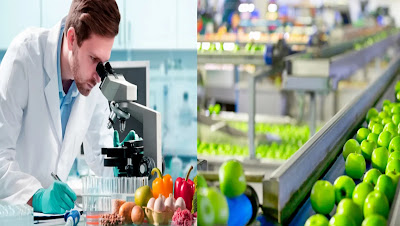5 Technologies That Will Change the World by 2025: You've probably heard about self-driving cars already, but how many of you know about the other technologies that will be making waves by the next decade? While most of these technologies are too futuristic to be available today, it's important to know what developments are on the horizon and to prioritize your own research. For five expert opinions, see this article.
Blog List:
1. In 2025, much of the world will have high-speed internet.
2. In 2025, much of the world will have a device that is always connected to the internet.
3. In 2025, genetic modification will be a major part of the food industry.
4. In 2025, there will be a major push for renewable energy sources
5. In 2025, robotics and artificial intelligence will continue to advance rapidly.
{tocify} $title={Table of Contents}
1. In 2025, much of the world will have high-speed internet.
A lot of people in the world don't have high-speed internet, but that's going to change over the next decade. In fact, there is a project called Google Loon that is working to bring high-speed internet to the entire world. Whether you want to experience a working WWI German automatic gun-carriage, or an online shopping adventure in a 19th century Paris bistro, there’s probably internet access today that you can use. Google wants it for everyone, on every continent, and they’re starting with Africa right now. Google made history by being one of the first companies to offer internet in Rwanda and recently completed two years of infrastructure building in Ghana. There will be opportunities galore beyond Africa.
2. Sooner or later, most apps will become free
As devices improve, they’ll be able to do more with the same amount of data and be connected to the web, allowing apps to connect to it. Between now and 2025, you’ll see a continued trend of mobile apps getting bigger, better, more connected, and free to download. By the end of the decade, sharing music with your friends will be as easy as sending an email. And today, you’ve probably used streaming services like Spotify, Pandora, and iHeartRadio. You know what you’re getting into.
3. Sensors will become implanted in your head
Over the past decade, how we interact with computers has fundamentally changed in ways that are radical, even by today’s standards. Companies like implants and-sensor company Neuralink are hoping that by next decade we will be able to wirelessly implant small devices into the brains of people to control a robot arm or telepathically communicate with other people. And yes, you have heard about Jade Raymond’s Super Bendy Hairdressing Machine.
Here’s the thing, folks: allowing neural implant technology doesn’t end at the neck- priming for something much bigger is on the horizon, and it’s happening faster than most of us realize.
2. In 2025, much of the world will have a device that is always connected to the internet.
In 2025, much of the world will have a device that is always connected to the internet, whether it’s a smartphone, a watch, a pair of smart glasses, a fitness band, or a smart ring. These devices will have natural language processing to understand what you want to do and will become your personal assistant. Whether you have a phone or not, every day in 2025 you’ll be asking Google “Hey Google, answer these 10 questions:” This can (and probably will) completely transform the way we live, work, and learn.
This article will uncover the 4 technologies needed to create a “world ready” smart ring device in 2021 and how those technologies may affect the future of search. Although the smart ring has been around since 2015, I am pushing it into 2021 because these technologies are rapidly advancing and Google surprised us in 2017 by releasing their Assistant functionality. No one knew they were working on such an exciting platform. As the creator of Video and founder of Empire, one of the fastest growing companies in Ireland, we can use our knowledge and experience in search, innovation, tech, and privacy to shape and lead this important new technology.
Let's get into it.
What is a Smart Ring?
The “smart ring” is a small wearable device that sits on the finger. The brilliant part is it can be controlled wirelessly over WiFi. You communicate with it using either your cell phone or tablet. It sends commands back to your phone that tell it to do things like answer calls. Google uses smart rings for context-based answering and more.
These days most of us already have a phone that is always streaming tons of information to it. These constantly connected devices can grow to be hundreds of pounds. Think about these things like your phone, laptop, and tablets. Essentially, they are all your “always on” items.
Read More Details: Blockchain.com: The ‘Ethereum’ of the Financial Industry
3. In 2025, genetic modification will be a major part of the food industry.
Genetically modified food is already a part of our lives, even if we don’t know it. For example, meat that’s been fed with hormones to grow faster is genetically modified. The problem with genetically modified products is that they are not labelled, so the consumer doesn’t know what they are eating. Also, we don’t fully know what chemicals are being used to grow beef or what requirements the animals have but we have all seen concerns about what happens to the water when food is treated with chemicals. Environmentalists argue that using genetically modified organisms means less nutrient-dense food for us. For example, Bovine Growth Hormone (BGH) is a byproduct of Bovine Embryonic Ndel, a hormone created by bovine milk that’s used in genetic modification.
2. By 2025, the global middle class will be $100,000. Rich countries’ middle class is small. In Japan, the middle class is over 120,000, in Argentina, it’s over 272,000, in Mexico, it’s over 181,000, and in the US… not so much. In the developing world, the middle class is particularly small and people are becoming increasingly poor, and in some places it’s even less. The growth of the middle class is putting pressure on the government to tackle poverty (illustrated in the time issue graphic below from Forecast. The point of this article is not to debate the ethics of BGH or genetically modified organisms (labeling). The point of this article is to talk about the practical applications: what is the future going to hold for the world of food and how will I grow my business accordingly?
3. Milk, Eggs, Soybeans: The World’s Top 10 Foods by Land Area, Produce Yield, and Protein Plants dominate the food chain and they have an enormous impact on the environment. Plants require many resources including water, land, lumber, fuel, fertilizer, sunscreen, etc. However, many experts (including myself) would like to see more animal products promoted as being environmentally friendly since they not only require a smaller footprint but produce fewer greenhouse gases (GHGs). Meat and dairy are the two biggest sources of air pollution in the world.
4. In 2025, there will be a major push for renewable energy sources
The number of countries that are investing in renewable energy is growing. The US Department of Energy predicts that by 2025, 70% of the world’s power will be renewable. This is great news for the earth, but not so great for the fossil fuel industry. In contrast with the developing world, where renewable energy accounts for only 10% of all energy consumption, in the western world, it’s doing much better, especially compared to large regional centers like China, where it contributes only 14% of energy. Similar statistics show that if the US continues to increase its renewable energy production, it will surpass Russia (which consumes about 34% of the world’s energy) by 2025.
From an economic standpoint, there will be more people able to work who aren’t tied to a desk.
However, the pipeline still has a long way to go. Though countries are investing in renewable energy at an unprecedented rate, 79% of the world’s renewable energy is still locked up in oil and gas areas. The problem is that the investments will only produce 1/5 of the energy that it will take to produce, so this doesn’t keep many countries from using more oil and gas, which will eventually cause an increase in greenhouse gas emissions.
In conclusion, if we want to change the current manufactured climate change, the best thing to do would be to reduce fossil fuel consumption dramatically. This can be done quite easily thanks to the 10 simple steps outlined in this article.
To be honest, it’s not really a manufactured problem. It’s a natural cycle that we cannot change indefinitely (unless we’re willing to take drastic actions). It requires political will and will require a lot of common sense. One tangible way to change the situation is to increase your energy efficiency by improving your furnace’s efficiency or installing a boiler that is more efficient. There are also companies working hard to retrofit heat pumps so they can use solar energy, thereby cutting down energy costs.
5. In 2025, robotics and artificial intelligence will continue to advance rapidly.
When you look at the advancements in artificial intelligence over the last 10 years, it’s hard to not be excited about what is to come in the future. Robotics is one of the most exciting fields of artificial intelligence, and in 2025, robots will become more advanced and useful in our everyday lives.
In a study, Digital Vision and Action, released in August 2020, Google showed that by 2025, about 2 billion people will have access to high-speed internet. And for Google, fast internet is just the start. These numbers only look set to grow throughout the coming years. And with advances in AI, Google believes that it will speed things up even more.
“As high volumes of data spur the use of artificial intelligence, and that AI generates its own interpretations of the data, it becomes increasingly important to ensure that these interpretations are correct so that we can respond to them fast," said Amit Singhal, head of Search at Google in an interview with Bloomberg’s Garrett Poliakoff. “Humans who don’t have time to spend their precious time updating these interpretations every time a data point is diagnosed are redundant.”
In the study, it also shows an increase in AI markets and AI agreements, as companies pour dollars into these industries. China is what drives a 2013 study that shows how 56% of AI companies are based in China. It was also reported that 46% of Marketers who specialize in AI-based solutions were based in the United States.
Of course, AI isn’t just important in China. For many other countries, it is an imperative. China is investing heavily in AI to create its own information and Internet empire. In September 2019, respected Chinese newspaper China Daily reported how the government invested US$1.4 billion into the AI and robotics industries, and significantly increased the number of government data centers to 40,000.
Further proof of how AI is reshaping the world is with Tesla’s Supercharger stations.
Conclusion: The next decade is going to bring about some major changes in how we live our lives and how we do business.
Read More Details: The Future of Vaccines: Nanotechnology













0 Comments